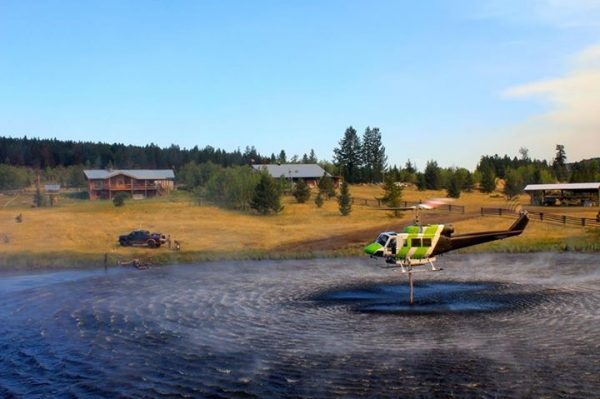Nearly one year after a smoky summer of evacuations, destroyed landscapes, and emotional trauma, one must wonder – what can we learn from a natural disaster? To Kathy Lauriente, counsellor and interim associate dean at the Williams Lake TRU campus, “As summer approaches, it’s important not to get caught in the drama when it comes to imagining worst case scenarios in regards to displacement, upheaval, loss and compromised air quality.”
Having experienced the impact of the devastating wildfires last year, Kathy said, “We had no idea what was coming. Moving forward, we hope for improved strategies and response plans on every level.”
At the height of the wildfire’s threat in Williams Lake, Kathy left her husband behind to monitor activity at their Riske Creek property, and took his 99-year-old mother to safety. “It was a very eerie trip, passing through the smoke and evacuated centres.”
After an agonizingly slow seven-hour journey to Kamloops, they had to continue drive to Kelowna as there were no hotel rooms available in the city. “I said to my mother-in-law, ‘I’m really sorry about this – We’re a bit like Joseph and Mary, and no room at the inn.’ To which she responded, ‘This is the most fun I’ve had in years.’”
Kathy laughed at the memory; to her, humor is a crucial component to coping and survival. The stress of caring for someone in unsettled conditions was quite the feat. Her emotional landscape shifted as she described memories of last summer. Recalling their trip, she choked up at the memory of kids waving signs encouraging evacuees to “stay safe.”
“The hardest part for me was saying goodbye to my husband. What kept me going was the community was going to take care of him.”
Through a Riske Creek community Facebook group, the support was ongoing. If ever someone’s property was in danger, a member could post on the page, and “within 10 minutes, you’d have a dozen people at their place,” Kathy recalled.
“We did everything we could to protect our region. We lost 50 acres of pasture and fencing, but luckily, no animals or structures were lost.”

Forestry helicopter doing two-minute circuits, pulling water from the pond on the Riske Creek property to manage the fire beside their house.
Kathy’s recollections of that intense season is an emotional jumble, but her optimism and effervescence remain intact. She counts her blessings whenever possible: “So many locals experienced economic hardship during and following the wildfires. Even through the campus closures, TRU did not interrupt our pay schedules, so no one had to struggle financially, or apply for Employment Insurance, which was an amazing gesture.”
As anxiety levels increased in the face of rising temperatures and media releases – heightened by exhaustion resonating from that hectic summer – Kathy recommends spinning worry into action. “Focus on what you can control. Do not invite anticipatory stress. It takes mental discipline, but ultimately, productivity can replace that sense of helplessness that accompanied last year’s experience.”
Don’t wait until you’re in a panic to prepare – be proactive and plan ahead
- Write an evacuation checklist by reflecting on your packing from last year.
- Pack a bag and make sure everything is clearly labeled. In a hurry, Kathy grabbed her husband’s basket and drove all the way to Kelowna with 43 of his Harley Davidson t-shirts.
- Organize documentation: identification, passports, birth certificates and important paperwork.
- Prepare for insurance purposes by taking pictures of every room in the house.
- Identify irreplaceable items: consider safety deposit boxes or fireproof safes for heirlooms, art, photo albums. Kathy recommends scanning family photos, as well as paperwork.
- Fireproof your property: reduce risk, cut back shrubbery and have a fire hose ready.
- Maintain your sense of humor: “keep yourself open to the absurdity of it all.”
- Naming your fears by identifying your concerns makes them less intimidating.
- Participate in workshops (keep an eye out for preparedness and mental health focused seminars).
- Keep everything topped up: ensure that mobile devices are charged and there is gas in the tank. Have cash and supplies stockpiled aside.
- Check in on your neighbours and find strength in the community.

